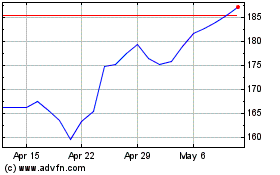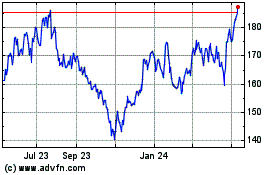Stock Market News for December 13, 2011 - Market News
December 13 2011 - 4:06AM
Zacks
Markets reversed gears on Monday
and receded into negative territory after the European accord
concluded on last Friday faced criticism from Fitch Ratings and
Moody's Investors Service. Tech-giant Intel also contributed to
weak investor confidence after the company projected revenues lower
than its earlier projections.
The Dow Jones Industrial Average
(DJIA) plunged 1.3% to close the day at 12,021.39. The Standard
& Poor 500 (S&P 500) slumped 1.5% to finish the day’s
trading at 1,236.47. The Nasdaq Composite Index settled
substantively lower at 2,612.26, declining by 1.3%. However, the
fear-gauge Volatility Index (VIX) showed that investor concerns had
receded somewhat, dropping 2.7% to settle at 25.67. Decliners
outpaced advancing stocks on the New York Stock Exchange (NYSE).
For 77% of the decliners, merely 20% stocks managed to climb higher
with the remaining unchanged. Total volume on the NYSE was 3.64
billion shares.
The Dow had sunk by 243 points
before final hour trading helped to limit the losses. However,
final hour trading was not strong enough to save 28 of the 30 Dow
components from dropping into the red zone. Walt Disney Co.
(NYSE:DIS) and McDonald's Corp. (NYSE:MCD), which gained 0.3% and
0.5%, respectively, were the only Dow components that managed to
grab a seat in the green. Tech-giant Intel Corporation
(NASDAQ:INTC) suffered the second-heaviest fall among the Dow
components, slumping by 4.0%. Intel is the latest to fall prey to
the disk-drive shortage situation and the stock fell after the
company trimmed its fourth quarter revenue projections.
Intel’s reduced sales forecast
affected the broader rally and the tech sector took a battering.
The PHLX Semiconductor (SOX) index dropped 2.8% and other tech
stocks like Advanced Micro Devices, Inc. (NYSE:AMD), Texas
Instruments Inc. (NYSE:TXN), Broadcom Corp. (NASDAQ:BRCM),
International Business Machines Corp. (NYSE:IBM) and
Hewlett-Packard Company (NYSE:HPQ) plunged 4.3%, 2.7%, 3.4%, 1.2%
and 1.6%, respectively.
Once again, cross-Atlantic concerns
dampened the sentiment on the home front. Just as markets were
buoyed by positive developments from the other side of the Atlantic
last week, which concluded with the European deal, the regions’
concerns yet again afflicted the benchmarks in the US. Friday’s
European deal, where almost all European Union (EU) nations but
Britain agreed to adhere to strict budgetary measures, was
criticized by rating agencies Fitch Ratings and Moody's Investors
Service.
Fitch believes that Europe faces a
looming economic downturn. The rating agency criticized leaders’
failure to lay out a “comprehensive” resolution the sovereign debt
crisis of the region. The agency said: “It seems that a
‘comprehensive solution’ to the current crisis is not on offer”.
“The lack of a comprehensive solution has increased short- term
pressure on euro-zone sovereign credit profiles and ratings… It
means the crisis will continue at varying levels of intensity
throughout 2012 and probably beyond, until the region is able to
sustain broad economic recovery,” the agency added.
Meanwhile, Moody’s also disapproved
of the European accord that seemed impressive enough to contribute
to the markets’ rally on Friday. The rating agency sees the
European crisis treading a “critical and volatile stage," and said
the pact would not reduce the chances of a sovereign ratings
downgrade of the Euro nations. Moody’s stated: "The crisis is in a
critical and volatile stage, with sovereign and bank debt markets
prone to acute dislocation which policymakers will find
increasingly hard to contain…Moreover, the longer the incremental
approach to policy persists, the greater the likelihood of more
severe scenarios, including those involving multiple defaults by
euro area countries and those additionally involving exits from the
euro area”.
On a sector-wise basis, financial
and the energy sectors suffered the most. The Financial Select
Sector SPDR (XLF) fund was down 2.4% and stocks like Bank of
America Corporation (NYSE:BAC), Morgan Stanley (NYSE:MS),
Citigroup, Inc. (NYSE:C), JPMorgan Chase & Co. (NYSE:JPM) and
The Goldman Sachs Group, Inc. (NYSE:GS) plunged 4.7%, 6.1%, 5.4%,
3.4% and 3.4%, respectively. As for the energy sector, stocks which
felt the heat included Marathon Oil Corporation (NYSE:MRO), Suncor
Energy Inc. (NYSE:SU), Occidental Petroleum Corporation (NYSE:OXY)
and ConocoPhillips (NYSE:COP) and they were down 3.6%, 3.5%, 2.8%
and 2.0%, respectively.
ADV MICRO DEV (AMD): Free Stock Analysis Report
BANK OF AMER CP (BAC): Free Stock Analysis Report
BROADCOM CORP-A (BRCM): Free Stock Analysis Report
CITIGROUP INC (C): Free Stock Analysis Report
CONOCOPHILLIPS (COP): Free Stock Analysis Report
DISNEY WALT (DIS): Free Stock Analysis Report
GOLDMAN SACHS (GS): Free Stock Analysis Report
HEWLETT PACKARD (HPQ): Free Stock Analysis Report
INTL BUS MACH (IBM): Free Stock Analysis Report
INTEL CORP (INTC): Free Stock Analysis Report
JPMORGAN CHASE (JPM): Free Stock Analysis Report
MCDONALDS CORP (MCD): Free Stock Analysis Report
MARATHON OIL CP (MRO): Free Stock Analysis Report
MORGAN STANLEY (MS): Free Stock Analysis Report
OCCIDENTAL PET (OXY): Free Stock Analysis Report
SUNCOR ENERGY (SU): Free Stock Analysis Report
TEXAS INSTRS (TXN): Free Stock Analysis Report
Zacks Investment Research
Texas Instruments (NASDAQ:TXN)
Historical Stock Chart
From Sep 2024 to Oct 2024

Texas Instruments (NASDAQ:TXN)
Historical Stock Chart
From Oct 2023 to Oct 2024
